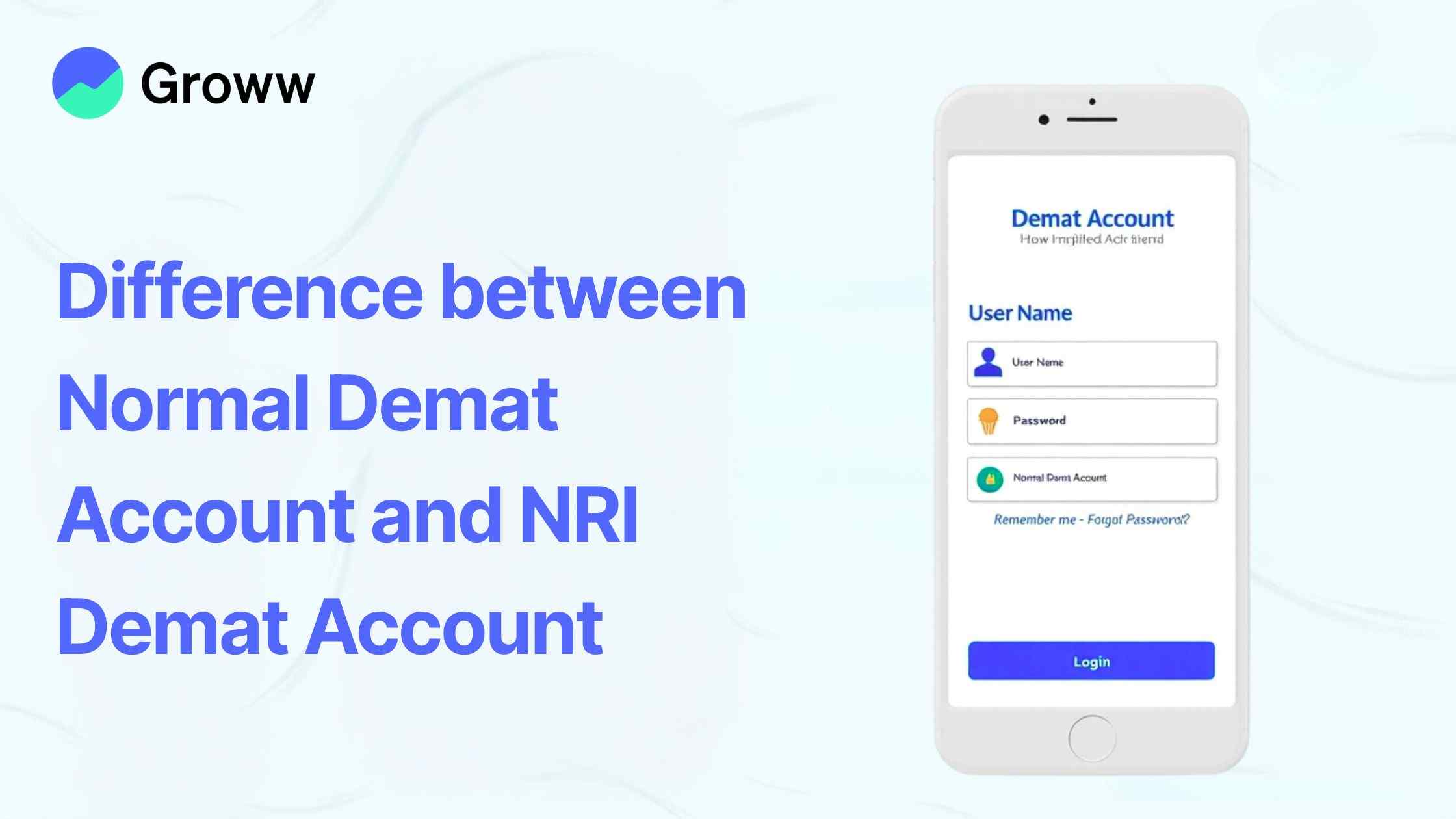Difference between Normal Demat Account and NRI Demat Account

A Demat account is necessary for everyone to trade in the stock market, whether they live in India or not. However, the regulations, processes, and rules can change, depending on where you live. Being aware of the difference between a normal demat account and an NRI demat account is essential to meet these regulations and organise your investments well.
Let us get into the NRI demat account vs normal Demat account debate by looking at their main features, key differences, rules set by authorities, and methods for converting.
What is a Normal Demat Account?
A normal Demat account is meant for people living in India to hold shares and securities virtually. Having a Demat account means you can buy, sell and transfer shares more easily without physical certificates.
Key Features:
- You must have a savings bank account in India for these.
- Indian authorities use them to purchase shares listed on the NSE, BSE, etc.
- It is put under the supervision of SEBI (Securities and Exchange Board of India).
- Opening a SIP account can be done at a Depository Participant (DP) such as a bank or brokerage.
What is an NRI Demat Account?
The FEMA (Foreign Exchange Management Act) has created an NRI Demat account for NRIs to legally invest in Indian shares.
There are two kinds of Demat accounts for NRIs.
- NRE (Non-Resident External) Demat Account: For investments made from foreign income. Repatriable (funds can be taken abroad).
- NRO (Non-Resident Ordinary) Demat Account: For investments made from income earned in India. Non-Repatriable (limited repatriation).
These accounts are regulated jointly by SEBI, RBI (Reserve Bank of India), and FEMA.
Key Differences Between Normal and NRI Demat Accounts
Let us round up some of the key differences for your perusal below.
|
Feature |
Normal Demat Account |
NRI Demat Account |
|
Eligibility |
Resident Indians |
Non-Resident Indians |
|
Linked Bank Account |
Resident savings account |
NRE/NRO bank account |
|
Regulatory Guidelines |
SEBI |
SEBI, RBI, FEMA |
|
Repatriation |
Not applicable |
NRE-Repatriable, NRO-Non-Repatriable |
|
Investment Scheme |
General stock market transactions |
Requires PIS (Portfolio Investment Scheme) for NRE account |
|
Taxation |
As per Indian resident tax rules |
Subject to TDS and NRI tax laws |
|
Conversion Requirement |
Not applicable |
Must convert upon change of residential status |
|
Number of Accounts |
One demat account per individual |
Can have both NRE and NRO demat accounts |
Rules & Guidelines (FEMA, SEBI, RBI)
When it comes to NRI Demat account rules, the following regulations apply:
FEMA (Foreign Exchange Management Act)
FEMA governs all foreign exchange transactions. NRIs must invest in Indian stock markets via NRE or NRO accounts in accordance with FEMA guidelines.
SEBI Regulations
SEBI allows NRIs to invest in equity markets through recognised stock exchanges but mandates the use of a PIS (Portfolio Investment Scheme) route for NRE accounts.
RBI Guidelines
- RBI requires NRIs to open a separate NRE/NRO bank account and obtain approval under PIS for trading.
- Any change in residency status must be immediately reported, and the Demat account must be converted accordingly.
Can an NRI Convert a Normal Demat Account?
Yes, it is mandatory for a resident Indian who becomes an NRI to convert their normal Demat account into an NRI Demat account. This involves:
- Closing the existing resident Demat account.
- Opening an NRE/NRO Demat account through a registered DP.
- Transferring securities from the old account to the new NRI-compliant Demat account.
- Getting a PIS approval (for NRE accounts) from the RBI via a designated bank.
It is illegal for NRIs to operate a normal Demat account post their change in residential status. Non-compliance could attract penalties under FEMA.
Conclusion
It is very crucial to understand what the differences and somewhat complex requirements are for a normal Demat account versus an NRI Demat account to remain compliant for proper investing. Normal Demat accounts work well for residents of India. Non-resident Indians are required to follow a specific process to remain compliant with regulations. NRIs must open NRE/NRO accounts and go through a specific regulatory process.
Whether you are moving to NRI status or investing from overseas, your Demat account must clearly indicate your identity and residency as of that date. This is a must to ensure compliance with the RBI, SEBI, and FEMA guidelines.